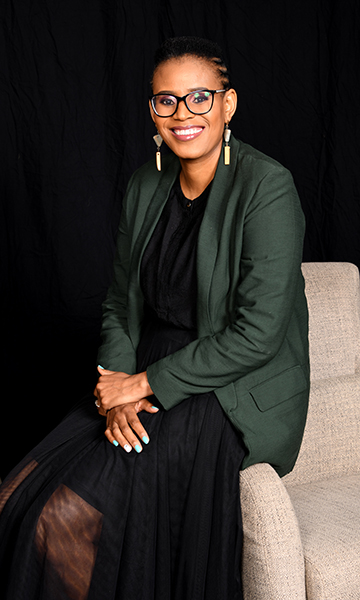News & Events
Postgraduate-centred statistics support
Multi-, inter- and transdisciplinary research is at the core of all the activities of the College of Graduate Studies (CGS), providing a unique range of opportunities for master’s and doctoral research under high-quality supervision. Princess Masondo, a statistician in the School of Interdisciplinary Research and Graduate Studies, plays a key role by ensuring that Unisa postgraduate students are supported with statistics-related aspects of their studies.

Princess Masondo
Speaking about her role and passion for statistics, this is what she had to say:
Role as the CGS statistician
My role is to assist the CGS through the School of Interdisciplinary Research and Graduate Studies to achieve excellence in research support. Specifically, my role involves providing statistical support to postgraduate students with regard to different aspects of their research, such as study design, sample selection strategy, sample size determination, statistical data analysis plan, design of data collection instruments, data capture, statistical data analysis and interpretation of results. I am basically here to ensure that postgraduate students are supported in any statistics-related aspects of their studies. This is executed in the form of workshops, group working sessions and one-on-one sessions.
My support to postgraduate students is expected to contribute towards an improvement in the quality of quantitative research produced by postgraduate students. It is anticipated that this will, in turn, contribute towards an improvement in master’s and postgraduate students’ publication. I am also expected to contribute towards increasing the college’s research outputs by producing self-authored and co-authored articles and papers.
I am a member of the college’s research ethics committee, where I review protocols, with a focus on adherence to ethical principles, soundness and adequacy of statistical methods proposed for the study. I also perform a similar role for the college’s community engagement committee.
Passion for statistics
I first encountered statistics as a course when I had to select subjects for my first-year level of BSc in Computer Science. I had computer science and mathematics as compulsory subjects and I had to select two more subjects from a long list, including chemistry, physics, mathematical statistics, applied mathematics, and a few others. I was very happy with computer science, as it was what I intended to major in; I also enjoyed mathematics. I had no idea what mathematical statistics and applied mathematics entailed, but I was also very sure that I did not want to take physics, biology and chemistry. So, my inclusion criterion was any module that had mathematics as part of its name. Fortunately, applied mathematics and mathematical statistics were the only ones that met this criterion. The population from which I could sample was reduced to only two elements. Consequently, mathematical statistics and applied mathematics were sampled with certainty. That was the beginning of my journey in the field of statistics. I eventually ended up majoring in mathematics and mathematical statistics, instead of computer science. I then went on to pursue an honours degree in statistics and, as they say, the rest is history.
I am passionate about statistics because it is an application of mathematics that allows me to fuse my interest in mathematics and programming. You are also allowed to add your own touch to your work, as it is very common to have more than one approach to the same problem. Furthermore, the problems you tackle are very diverse and, as such, you get to interact with experts from different fields and apply different statistical techniques, thus expanding your knowledge base. As John Tukey puts it, “The best thing about being a statistician is that you get to play in everyone’s backyard.” The intellectual challenge that accompanies this career also keeps the work exciting.
Skills and talents fine-tuned to benefit postgraduate students and staff
I have sound experience in survey methodology, which I gained through my tenure at Statistics South Africa. I also have seven years of experience as a statistical analyst at Tshwane University of Technology (TUT). In those seven years, I assisted many postgraduate students and staff members from different faculties with statistical components of their projects. I have experience in the use of different statistical analysis techniques, from basic to advanced, in many different fields. I also have experience in facilitating statistics workshops.
I was a member of the Faculty of Management Sciences Committee for Postgraduate Studies at TUT for three-and-a-half years, where I was responsible for reviewing research proposals with a special focus on soundness and adequacy of statistical methods proposed for the study. I was also a member of the TUT Research Ethics Committee for six years.
Having previously worked with postgraduate students, I am conversant with their needs and the challenges they experience in general throughout their research journey. I am also familiar with the challenges they experience regarding writing methodology sections of their research proposal, coupled with their overriding fear of statistics. I have learnt to embrace all students and to guide them to a point where they are able to do what is needed.
I love working with people and I have good interpersonal skills. I am also committed to my work. I see my role at CGS as an opportunity to contribute towards ensuring that postgraduate students have a positive experience in their studies, are equipped with statistical skills required for their studies and are supported to complete their studies in good time.
*Submitted by Mpho Moloele, PR and Communications Assistant, Research Support Directorate
Publish date: 2021-07-29 00:00:00.0

